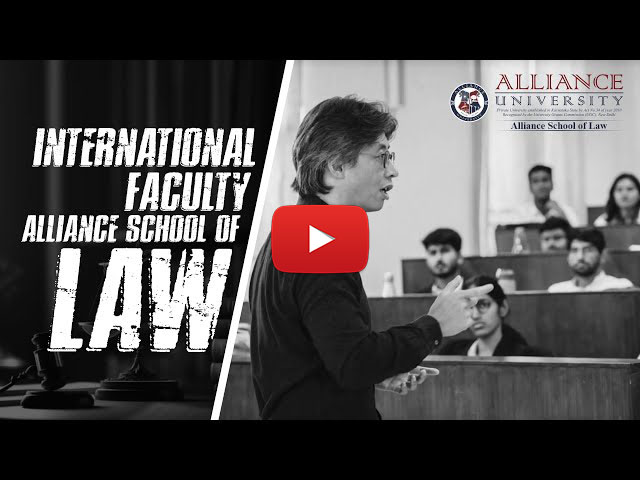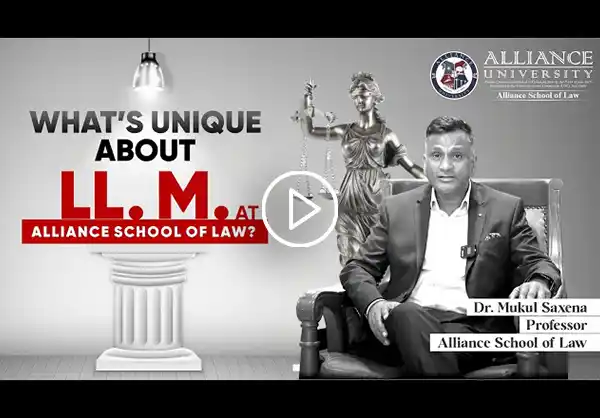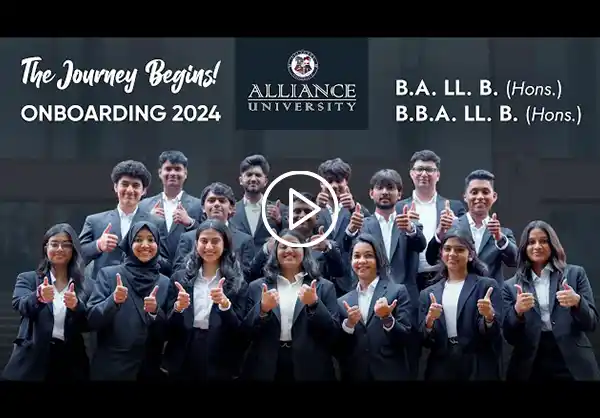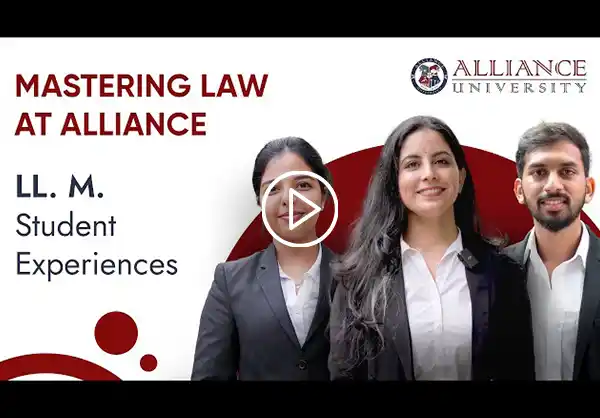Admission Enquiry
HELPLINE:
+91 96060 48543/+91 80 4619 9048
Programs
Master of Law (LL. M.)
Overview
The LL. M. programme equips students with advanced knowledge in legal principles, justice, and governance. Emphasising robust research acumen and subject–matter expertise, the curriculum and teaching pedagogy concentrate on domestic, international, and comparative law subjects. The learning experience involves classroom training through seminars, workshops, and research–centric discussions, fostering a comprehensive understanding of legal intricacies.
Duration
One year (Full time)
Commence of the course
January 2020 & July 2020
Course Duration
1 Year
Mode of Study
Full Time Course
Eligibility
LL. B. / B.L. or any other graduate degree in Law recognised by Bar Council of India with a minimum of 45% marks (40% for SC / ST) in aggregate.
Key Features
Emphasis on robust research skills through seminars, workshops, and research-centric discussions.
Comprehensive curriculum covering domestic, international, and comparative law subjects.
Practical training and clinical programmes for hands-on teaching and lawyering skills.
Specializations
- Constitutional Law and Administrative Law
- Corporate and Commercial Law
- Intellectual Property Law
- Criminal Law and Security Law
- Taxation Law
- Legal Pedagogy and Research
- Constitutional and Human Rights Law
- Corporate Law
- Crime and Forensics Law
- Human Rights Law
- Intellectual Property Law
- IT and Data Protection Law
- Law, Climate Change and Sustainability
- Trade and Commercial Law
Pedagogy
The Alliance School of Law is committed to imparting world-class learning in law practice and governance to its key constituents. To fulfil this objective, the curriculum and teaching pedagogy is designed to prepare its graduates in the domestic, international, and comparative law subjects. Graduates from the Alliance School of Law study compulsory subjects and choose from an unparalleled range of elective subjects. In addition to Core Compulsory Law subjects, students are required to select the subjects for their area of specialization. Alliance graduates also acquire teaching and lawyering skills through practical training activities and clinical, legal programs even while they inculcate in themselves sound research and writing skills.
Learning Delivery
There are four subjects in the first semester and five subjects along with the Dissertation in the second semester.
Three (3) Core Compulsory Law subjects and Dissertation are of 3 credits each. Specialisation Six (6) subjects are of 2 Credits each.
Each credit is equivalent to 15 classroom contact hours and includes practical training classes.
Alongside classroom hours, a student are also required to conduct research projects, analyse Cases, review articles, and take up teaching assignment as a part of the curriculum.
For the award of the degree of LL. M., a student must successfully complete ten subjects consisting of 24 Credits.
Program Structure
Specializations Offered
| Sl. No. | Area of Specialization | Subject |
|---|---|---|
| 1 | Constitutional Law and Administrative Law | Constitutional Government and Centre State Relations |
| 2 | Corporate and Commercial Law | International Trade Law |
| 3 | Intellectual Property Law | General Principles of IPR Law and International Protection of IPR |
| 4 | Criminal Law and Security Law | Criminology and Criminal Justice Administration |
| 5 | Taxation Law |
General Principles of Taxation |
| 6 | Legal Pedagogy and Research |
Curriculum Planning, OBE & Develpment of Teaching Plan |
| Sl. No. | Area of Specialization | Subject |
|---|---|---|
| 1 | Constitutional and Administrative Law | Fundamental Rights and Directive Principles |
| Decentralization of power and Local Self Government | ||
| Administrative Law | ||
| Service Laws | ||
| Global Administrative Law | ||
| 2 | Corporate and Commercial Law | Corporate Governance and Corporate Social Responsibility |
| Competition Law | ||
| Mergers & Acquisitions | ||
| Law of Insolvency | ||
| ADR & Commercial Arbitration | ||
| 3 | Intellectual Property Law | Intellectual Property Law- I (Copyrights, Industrial Designs and other related Rights) |
| Intellectual Property Law- II (Trademarks and other related Rights) | ||
| Intellectual Property Law III (Patents and Allied Rights) | ||
| Cyber and Information Technology Law | ||
| Biotechnology and the Law | ||
| 4 | Criminal Law and Security Law | Victimology |
| Criminal Justice and Human Rights | ||
| International Criminal Law | ||
| Police Law and Administration | ||
| Sentences and Sentencing | ||
| 5 | Taxation Law | Law relating to Direct Taxes |
| Contemporary Challenges in Taxation | ||
| Corporate & Digital Taxation | ||
| International Taxation | ||
| GST and Customs | ||
| 6 | Legal Pedagogy and Research | Education Law |
| Clinical Legal Education (Legal Clinics & Clinical Methodology) | ||
| Supervision and Assessment of Student performances | ||
| Co-curricular Programmes & Law School Management | ||
| Educational Psychology and Adult Learning | ||
FAQ's
LL. M. (Legum Magister) is a 1-year master’s programme available for law graduates to equip students with advanced knowledge in legal principles, justice, and governance. Emphasising on robust research acumen and subject expertise, the LL. M. curriculum at Alliance University focuses on domestic, international and corporate law subjects.
Students can apply for the LL. M. programme at Alliance University by filling out the Application Form online.
There is no age limit to apply for the LL. M. programme at Alliance University.
Students must have an LL. B. or B. L. or any other graduate degree in law recognized by the Bar Council of India with a minimum of 45% marks (40% for SC/ST) in aggregate to apply online for the LL. M. programme at Alliance University. For more details, you can refer to the eligibility criteria on the Admission Process Page.
At Alliance University, the LL. M. Programme consists of many core subjects and specializations spread across 2 semesters. For more details, you can refer to the LL. M. Programmes Page.
The specialisations in LL. M. provided at Alliance University are Corporate Law; Crime and Forensics Law; Constitutional and Human Rights Law; Intellectual Property Law; IT and Data Protection Law; Law, Climate Change and Sustainability, and Trade and Commercial Law.
Yes. 1 year LL. M. is valid for a Ph. D.
An LL. M. (Master of Laws) programme is an advanced postgraduate degree that deepens knowledge in legal principles, governance, and justice. It covers domestic, international, and comparative law while emphasizing research, critical thinking, and subject-matter expertise. Through seminars, workshops, and research-driven debates, students develop a thorough grasp of legal complexities. This programme is ideal for law graduates and practicing lawyers who want to specialize and build expertise in specific areas of law.
Depending on your interests, the specialization you select, and whether you want to stay in practice, academia, or transition into corporate or policy roles, an LL. M. degree opens a wide range of professional options. Students can find employment in the corporate sector, policy-making organizations, legal commissions, legislative drafting departments, academia, arbitration, and mediation, among other fields.
Absolutely. The LL. M. programme at Alliance University offers aspiring lawyers the guidance, mentorship, and practical learning experiences needed to advance in their chosen field of law. Quality internships, moot courts, legal service clinics, and research-driven coursework prepare students to excel and thrive as legal professionals and scholars.
Alliance University's LL. M. course is a full-time, one-year programme with a minimum attendance requirement of 75%. Attendance is therefore a prerequisite for finishing the LL. M. programme and cannot be pursued alongside professional work.
The LL. M. programme at Alliance University is a 1-year programme recognized by UGC and governed by BCI. The programme aims to provide students with a deeper understanding of domestic, international, and corporate law while emphasising research, critical thinking, and subject matter expertise.
An LL. M. degree pursued after LL. B. or even an integrated LL. B. is a full-time one-year programme.
You can evaluate a law school or LL. M. programme based on curriculum, faculty, infrastructure, and career opportunities. The one-year LL. M. programme at Alliance University offers dual specialisations designed for the future. With experienced faculty, excellent infrastructure, and strong opportunities for internships and research, it has become a highly sought-after choice for law graduates.
You cannot pursue LL. M. without an LL. B., BA. LL. B., or a BBA LL. B.
Contact for Admissions
-
 Call Us
Call Us+91 96060 48543, 08046199048
-
 Email Us
Email Usllm@alliance.edu.in







